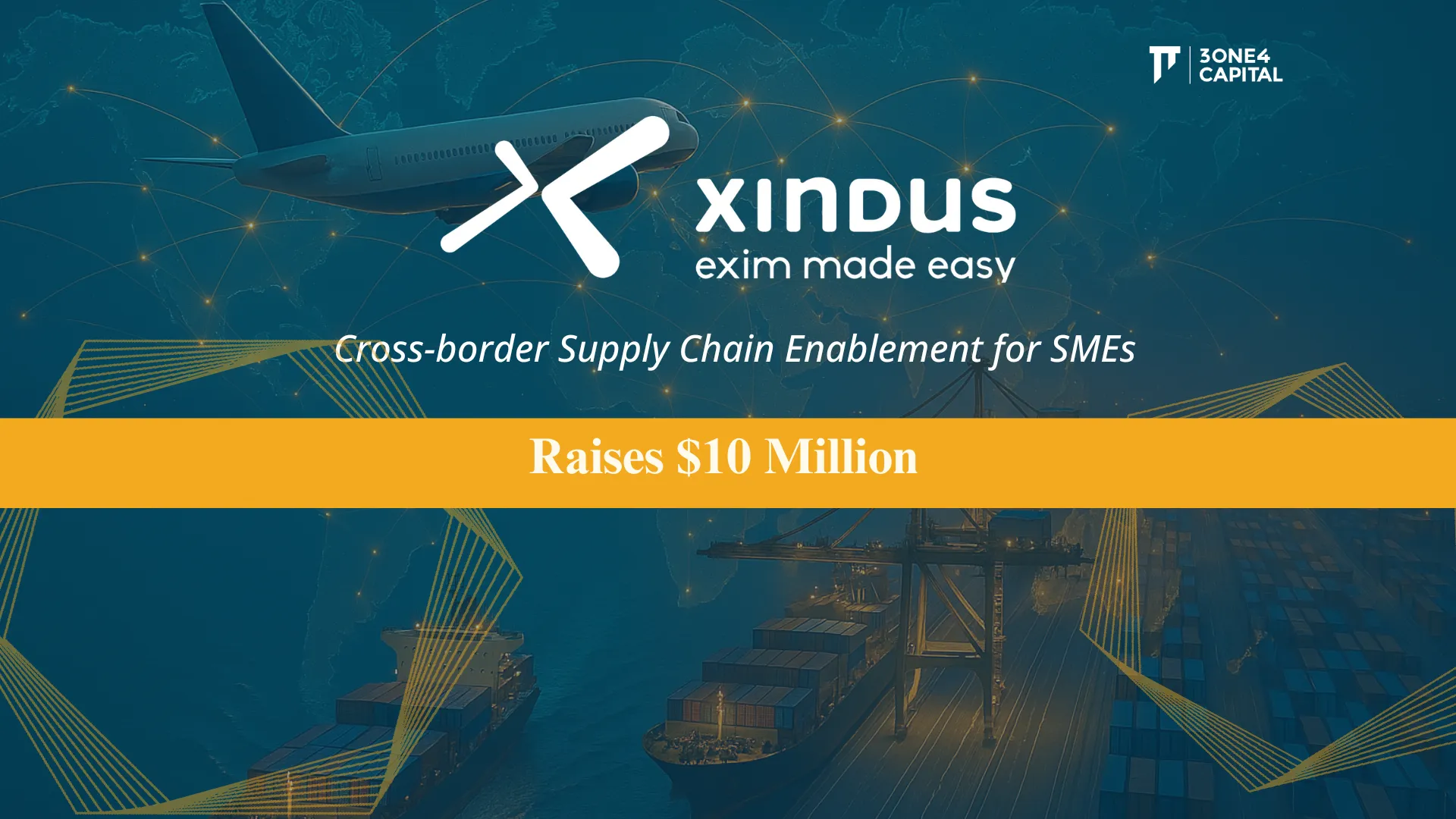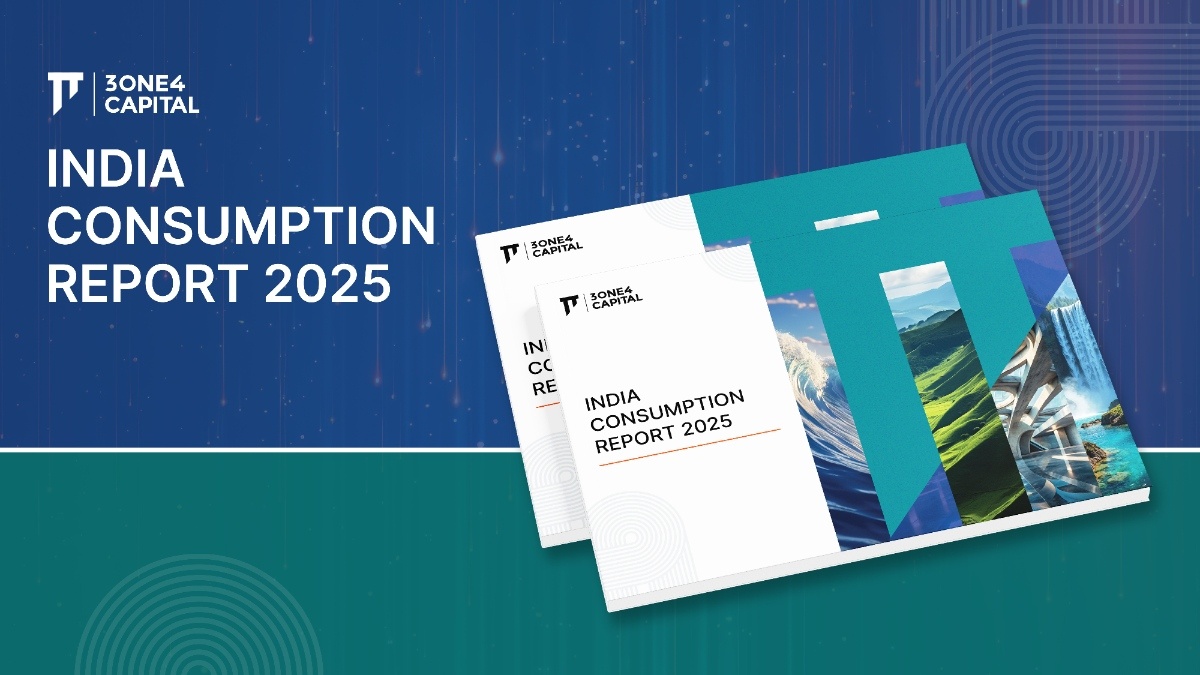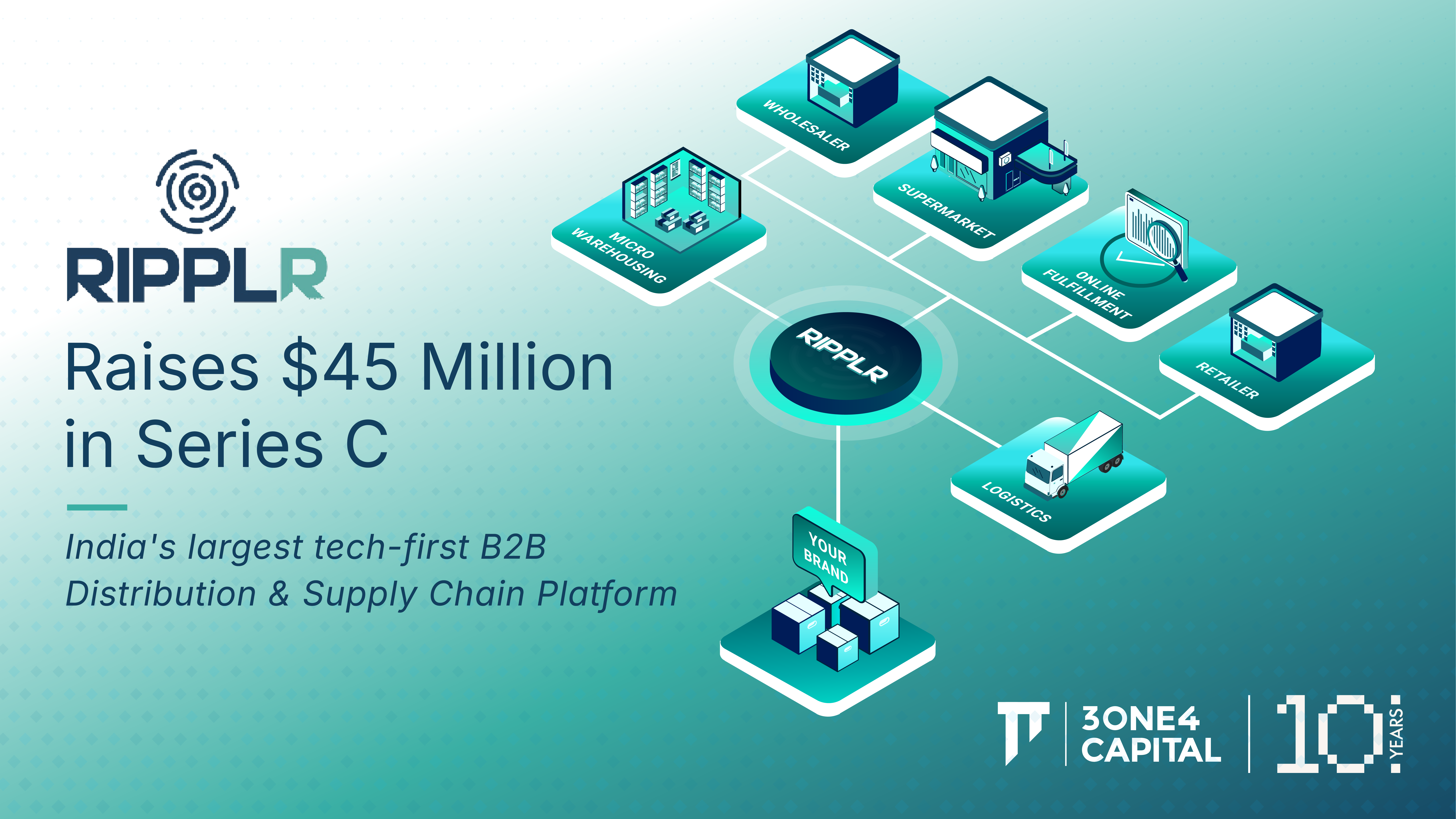
Xindus Closes $10M to Power India’s Cross-Border Expansion
3one4 Capital is thrilled to lead the $10 million funding round in Xindus, with Orios Ventures as a co-lead. At a time when India stands on the precipice of becoming a $5 trillion economy, exports and SME inclusion will be the defining levers of sustained and inclusive growth. Xindus is building the cross-border infrastructure to enable exactly that.
Its integrated platform - XindusOne - unifies global shipping, compliance, payments, and fulfillment, enabling Indian businesses to seamlessly access international markets.
The Missing Middle in India's Export Economy
India is the fastest-growing major economy in the world. In FY24, our nominal GDP touched $3.7T, and we’re on track to cross $5T well before 2030. But per-capita income remains the next frontier. To raise real incomes and avoid the middle-income trap, India must deepen its integration with global value chains.
While India leads in services exports, merchandise exports remain under-realized. The problem isn’t capacity - it’s accessibility. MSMEs contribute 45% of India's exports, yet fewer than 20% of registered SMBs participate in cross-border trade. Of those that do, nearly a third exit after just three transactions.
The Gaps That Hold India’s SMBs Back
Cross-border trade remains riddled with friction, especially for smaller businesses. Consider:
1. Inefficient Freight & Logistics Infrastructure
Cross-border logistics remain plagued by opaque pricing, limited freight partner options, and poor execution visibility, resulting in over 25% in overheads. The process is riddled with fragmented communication, cumbersome documentation, and a lack of accountability. Customs-related delays account for 65% of ocean freight disruptions (Avendus), making it especially hard for SMBs to manage international shipments without end-to-end support.
2. Trade Discovery Challenges
Over 60% of SMBs cite “finding business partners” as their biggest challenge (Facebook + OECD). Whether selling through distributors or directly to retailers, over 50% of SMB sales rely on intermediaries due to the lack of trustworthy discovery networks. The absence of a structured ecosystem results in fewer than 20% of registered SMBs participating in trade annually, with persistent trust deficits and fragmented buyer-seller-supplier relationships compounding the challenge.
3. Outdated Payments Infrastructure
Cross-border payments for SMBs are unreliable, expensive, and slow. WTO data suggests a 30–40% failure rate for such transactions. From high processing fees and currency conversion volatility to limited visibility and remittance delays, especially in emerging markets like India, the payment experience is fraught with risk. A PayPal survey found trade costs (74%), exchange issues (31%), and payment fraud (30%) to be the biggest barriers.
4. Lack of Accessible Trade Finance
Despite monthly exports touching $35B–$40B, only ~$2B is available in export credit, leaving 95% of trade underfunded. Complex banking procedures, high costs, and poor credit access prevent SMBs from obtaining timely financing. According to the ADB, a $1.5T global trade finance gap persists, 70% of it linked to SMBs in developing Asia. Alarmingly, 30% of Indian SMBs halt cross-border operations after just three transactions due to financing constraints (Avendus).
5. Absence of Trade Assurance Mechanisms
SMBs lack access to standardised frameworks that larger enterprises rely on to de-risk cross-border transactions. This leaves them exposed to quality disputes, shipping issues, payment delays, and legal vulnerabilities. Without mechanisms for trade assurance or recourse, Indian SMBs must absorb these risks, often without the capacity or expertise to do so effectively.
To unlock the full potential of India’s SMBs in global trade, it’s imperative to build a more transparent, trusted, and tech-enabled cross-border infrastructure, one that reduces friction, expands access to capital, and levels the playing field for the next wave of exporters.
The Xindus Advantage: Building the Infrastructure for Global Indian Commerce
Xindus is solving this with a bold vision: to become the operating system for India’s cross-border economy.
Their full-stack platform, XindusOne, integrates global logistics, payments, compliance, financing, and assurance into a single, intuitive interface tailored for Indian SMBs.
Here's what that unlocks:
- Global Shipping: Multi-modal access, real-time tracking, and 5–7 day turnaround vs the industry standard of 30
- Payments: Faster, cheaper, and compliant FX and remittance with full-stack reconciliation and settlement
- Compliance: Automated documentation, government scheme integrations, IOR capabilities
- Finance: Access to credit, working capital, and invoice factoring—unlocking liquidity when it’s needed most
- Trade Assurance: Risk mitigation on quality, payments, and delivery—helping SMBs build trust globally
This is not just an improvement, it’s a re-architecture of how Indian exporters engage with the world.
Why We Invested: The 3one4 Capital Thesis
At 3one4 Capital, we believe the next wave of transformative companies in India will emerge at the intersection of infrastructure, software, and inclusion. Cross-border trade, especially for SMBs, is a high-friction, high-potential category, ripe for reimagination.
Our conviction in Xindus stems from three core beliefs:
- A New Category With Massive Headroom: The export potential of Indian SMBs is under-tapped. A platform that reduces friction across shipping, compliance, payments, and trust can meaningfully grow the addressable market and transform India’s export mix. FedEx, DHL, UPS and traditional freight players were built for a different world - asset-heavy, margin-thin, and enterprise-focused. SMBs are underserved.
- Full-Stack Model With Embedded Retention: Xindus is not just solving one problem. It’s integrating multiple services - logistics, trade finance, buyer discovery, and compliance into a cohesive, defensible platform. The more a business uses Xindus, the more value it derives, and the more deeply embedded the platform becomes.
- The solution is overdue: An asset-light, tech-native, full-stack OS for exporters is no longer optional. It is the difference between ambition and scale.
Backing the Team That’s Building It
The Xindus founding team brings deep experience in logistics, operations, and technology. Their past track record at JUSDA gave them a first-hand view into the broken links of global supply chains and the conviction to rebuild them from the ground up. What makes them special is not just what they’re building, but how they’re approaching it: with precision, empathy for the user, and a firm belief that India’s small businesses deserve better tools.
With this new round of capital, Xindus will expand its presence in key trade corridors including the US, UK, Europe, Canada, Australia, and the Middle East. The company aims to onboard over 10,000 SMBs in the next 12–18 months and scale to over $200 million in GMV.
But more than just milestones, Xindus is building something systemic - an intelligent, integrated layer that sits between India’s supply and the world’s demand.
“Given the recent trends in global markets, India stands at a unique position to scale up its exports. We believe platforms like Xindus can fast-track India’s export growth, enabling manufacturers with the tools to streamline exports. We are very excited to support Saurabh as he builds India’s largest trade enablement platform.”
— Anurag Ramdasan, Partner, 3one4 Capital
India’s cross-border trade opportunity is massive, and as SMBs become more ambitious, tech-first platforms like Xindus will define the next phase of inclusive, export-led prosperity. We're privileged to closely witness and contribute to this unfolding narrative.


.webp)












